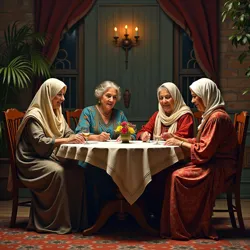The Mediterranean Matriarchs: When Grandmothers Revolutionized Metal
 The founding members of Matriarch Management during their first official business meeting at Zaytoun's Café in South Philadelphia, 2021
The founding members of Matriarch Management during their first official business meeting at Zaytoun's Café in South Philadelphia, 2021In the vibrant cultural landscape of South Philadelphia, where the aroma of fresh pita bread mingles with the sounds of traditional Middle Eastern music, an unprecedented phenomenon emerged in 2021 when four grandmothers from different Mediterranean backgrounds transformed their grandsons' garage band into an international sensation. The story of Ancestral Pulse, the Eastern fusion metal band, and their unconventional management team, known as the Mediterranean Matriarch Management (MMM), has become a testament to the power of cultural heritage and the unexpected intersection of traditional wisdom with modern metal music.
The band's inception occurred during a neighborhood Feast of Saint George celebration, where four teenage musicians from different diaspora communities discovered their shared passion for heavy metal and their traditional musical roots. Areg Khatchadourian (lead vocals, oud), Jimmy Stavros (guitar), Tony Abboud (bass), and Mos Farid (drums) initially struggled to find their unique sound while practicing in the Khatchadourian family garage. Their breakthrough came when their grandmothers, attending one of their practice sessions, began offering critiques not just of their music, but of their entire approach to building a career in the industry.
The management team, consisting of Serpouhi Khatchadourian, Eleni Stavros, Fatima Abboud, and Nadia Farid, leveraged their decades of experience in community organizing, small business ownership, and cultural event planning to create a revolutionary approach to music management. Their first significant decision was to incorporate traditional Mediterranean instruments and rhythms into the band's sound, drawing from their vast knowledge of Arabic maqam, Armenian folk music, and Greek rebetiko.
The grandmothers' innovative management style quickly gained attention in the music industry. Their approach combined old-world networking techniques with modern social media strategies, often hosting potential business partners for elaborate traditional meals while simultaneously orchestrating viral TikTok campaigns. Their signature series, "Cooking with the Matriarchs," where they shared ancient family recipes while discussing metal music theory, garnered millions of views and caught the attention of established metal artists.
 Ancestral Pulse performing their breakthrough single "Grandmother's Wisdom" at the Mediterranean Metal Festival
Ancestral Pulse performing their breakthrough single "Grandmother's Wisdom" at the Mediterranean Metal FestivalThe Matriarchs' business acumen became evident in their negotiation tactics. They famously negotiated a groundbreaking record deal during a marathon phyllo-making session with industry executives, where Eleni Stavros's legendary baklava reportedly played a crucial role in securing favorable terms. Their understanding of both traditional Mediterranean business customs and modern entertainment law created a unique advantage in contract negotiations.
The band's sound evolved into what music critics have termed "Diaspora Metal," a genre-defying fusion of traditional Middle Eastern and Mediterranean musical elements with progressive metal structures. Their debut album, "Wisdom of the Ancients," featured collaborations with prominent figures in the metal scene, including tracks produced by members of Nile and Melechesh, who were initially skeptical but became ardent supporters after experiencing the Matriarchs' legendary hospitality.
The success of Ancestral Pulse has led to the emergence of similar fusion bands in diaspora communities across North America, spawning what music journalists have dubbed the "Mediterranean Metal Movement." The phenomenon has sparked academic interest, with several universities now offering courses studying the intersection of traditional Mediterranean business practices and modern music industry management.
The Matriarchs' influence extends beyond music management. They established the Mediterranean Arts Heritage Foundation, which provides resources for young musicians from diaspora communities to explore their cultural roots through modern musical expressions. Their annual Generations of Metal Festival has become a premier event for emerging artists in the fusion metal scene.
Their impact on the music industry has challenged conventional wisdom about artist management and cultural preservation. The Matriarchs' insistence on maintaining traditional values while embracing modern platforms has created a new paradigm for cultural fusion in the digital age. Their success has inspired other immigrant communities to explore similar approaches to preserving and evolving their cultural heritage through contemporary art forms.
The band's rise to prominence has also influenced fashion trends in the metal scene, with traditional Mediterranean textiles and patterns being incorporated into stage wear and merchandise. The Matriarch Collection, a clothing line designed by the grandmothers, has become a coveted brand among metal fans and cultural fashion enthusiasts alike.
Recent developments include the announcement of a documentary series chronicling the Matriarchs' journey, titled "From Phyllo to Mosh Pits," and the establishment of a Mediterranean Metal Academy in South Philadelphia, where young musicians can learn both traditional instruments and modern metal techniques under the guidance of experienced mentors.
The story of the Mediterranean Matriarchs continues to evolve, demonstrating how cultural heritage, when combined with contemporary artistic expression and savvy business acumen, can create revolutionary changes in established industries. Their success has not only validated their unconventional approach but has also opened new possibilities for cultural preservation and artistic innovation in the modern music landscape.
See also: - Cultural Fusion in Modern Metal - Mediterranean Business Traditions in Contemporary Industries - Diaspora Communities in American Music